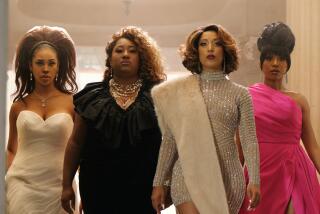Betty Furness; Ad Star, Consumer Advocate
- Share via
Betty Furness, actress, pioneering pitchwoman and consumer ombudsman on television and for various government agencies, has died. She was 78.
Miss Furness, who had suffered from stomach cancer for four years, died Saturday at Sloan-Kettering Memorial Hospital in New York, said her husband, Leslie Midgley.
Intrigued by politics as much as consumer advocacy, Miss Furness was named special assistant to the president for consumer affairs by President Lyndon B. Johnson in 1967. Despite criticism that her only consumer experience was touting refrigerators and vacuum cleaners for Westinghouse, she earned respect from consumer organizations for her strong stand on credit regulation, federal meat inspection and hidden interest rates.
“There was hostility, especially at first when I used to speak before business groups,” she told The Times in 1976. “It bothered me, because as a performer I had always worked to applause. But then I came to the conclusion that their reaction meant that I was doing something right. So the hostility became a compliment.”
After her work with the Johnson Administration, Miss Furness served as executive director of the New York State Consumer Protection Board and after that was named commissioner of the New York City Department of Consumer Affairs.
One of the most recognized of government officials, Miss Furness was a fixture on television from its earliest days. When commercials were complex live productions, she demonstrated Westinghouse appliances from 1949 to 1960, ending every spot with her confident “You can be sure if it’s Westinghouse.”
She ventured into a different area of television consumerism late in her career, as a consumer reporter for NBC’s “Today” show from 1976 to 1992, first dealing with consumer complaints and later conducting investigations. During the turbulent summer of 1976 in the aftermath of Barbara Walters’ storied leap from NBC to ABC, Miss Furness also worked as co-host of “Today” and was seriously considered as Walters’ replacement.
“She pioneered consumer TV news reporting, and she pursued it with intelligence, inquisitiveness and irrepressibility,” consumer advocate Ralph Nader said when Miss Furness left the network in 1992.
Born to privilege in New York City, Elizabeth Mary (Betty) Furness grew up on Park Avenue and attended the Brearley School in New York City and Bennett Junior College in Millbrook, N.Y. When she was 14, at the height of the Depression, Miss Furness’ father urged her to do “something useful.” She worked for two summers modeling for the John Robert Powers agency, earning a total of $80.
The agency arranged a screen test for her at RKO, and at 16 she was off to Hollywood, where she made 35 movies over six years.
“They were appalling,” she said years later, “except for two--’Swing Time’ with Fred Astaire and Ginger Rogers, and the first ‘Magnificent Obsession’ film.”
Attracted to the stage, Miss Furness won a part in director Stella Adler’s West Coast production of “Golden Boy” in 1937. She spent the next decade in summer stock and road companies in such plays as “My Sister Eileen” and “Doughgirls.”
But failing to achieve major success on stage, Miss Furness returned to New York in 1948 to try the developing medium of television. Her first venture was a 15-minute show called “Fashions, Coming and Becoming.” She did the narration and the commercials for $50 a show.
Westinghouse officials approached her after she had a small role in “Studio One,” and by 1950 she was earning $100,000 a year opening refrigerator doors on live television.
She became a national folk heroine when Westinghouse sponsored the first telecast of a national political convention in 1952.
“Who’s winning, Pop?” a character asked in an Indianapolis News political cartoon, demonstrating her instant celebrity. “Taft? Ike? Or Betty Furness?”
Her work at political conventions in 1952, 1956 and 1960 sparked her interest in politics and public affairs. Leaving Westinghouse when the new filming of commercials dulled her interest in the work, she went on to moderate a local New York television panel show, “At Your Beck and Call.”
In the early 1960s, Miss Furness hosted a CBS radio show, “A Woman’s World,” and a WABC-TV daily panel program, “Answering Service,” which was nominated for an Emmy.
She met President and Lady Bird Johnson while working for Citizens for Johnson and Humphrey in 1964. After the election, she toured the country for Mrs. Johnson, appearing on 152 radio shows and 89 television programs to recruit VISTA and Head Start workers. She also hosted “Coffee With the First Lady” and fund-raising telethons for Democratic candidates.
When Johnson named her consumer adviser, Miss Furness humorously parried criticism about a lack of experience as an average consumer by saying: “I will start shopping for myself tomorrow.”
Miss Furness was married three times--in 1937 to composer and conductor John Waldo Green, with whom she had a daughter, Barbara; in 1945 to radio announcer Hugh B. Ernst, who died in 1950, and in 1967 to Midgley, executive producer of news for CBS.
More to Read
The biggest entertainment stories
Get our big stories about Hollywood, film, television, music, arts, culture and more right in your inbox as soon as they publish.
You may occasionally receive promotional content from the Los Angeles Times.










